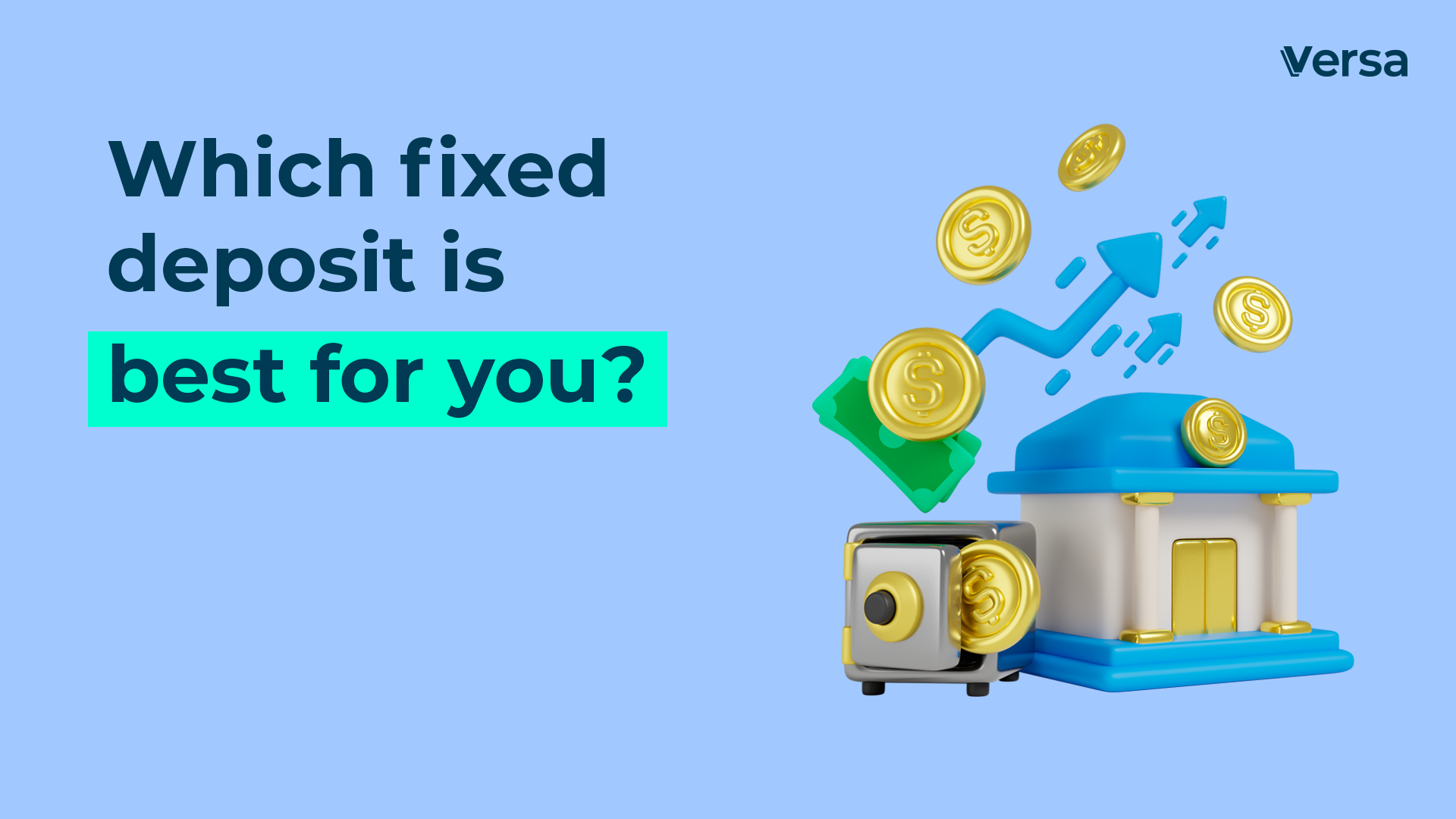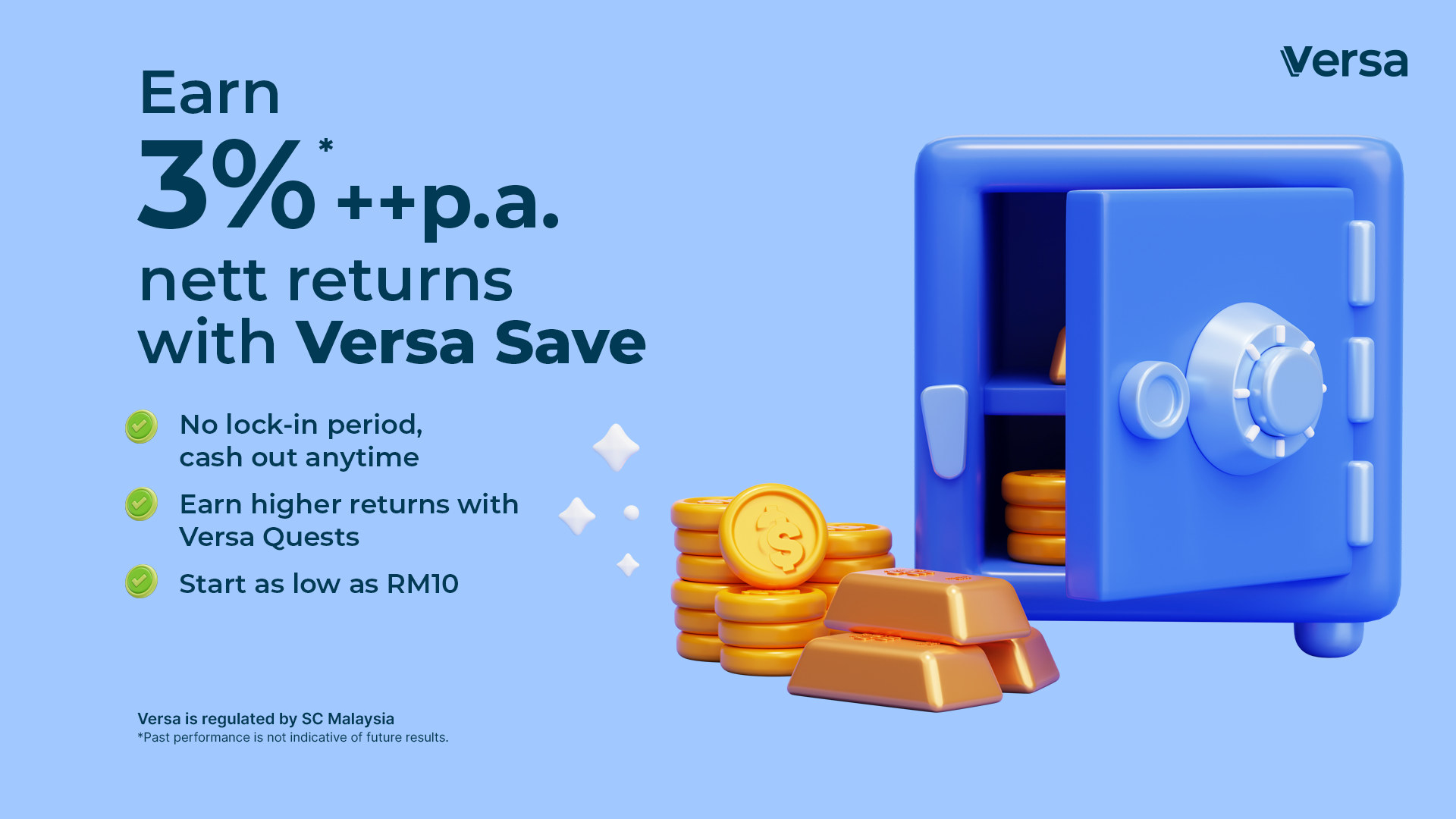
Everything You Need to Know About Fixed Deposits:
- Fixed Deposit Rate of Major Banks in Malaysia
- What are Fixed Deposits?
- How Do Fixed Deposits Work?
- Difference Between Savings and Fixed Deposit Accounts
- What Are the Benefits of Investing in a Fixed Deposit?
- What Are the Different Types of Fixed Deposits in Malaysia?
- What Factors Affect the Fixed Deposit Rates in Malaysia?
- How to Choose the Best Fixed Deposit Rate in Malaysia?
- What Are the Risks of Investing in a Fixed Deposit Malaysia?
- How to Open a Fixed Deposit Account in Malaysia?
- Alternatives to Fixed Deposits
Fixed Deposit Rate of Major Banks in Malaysia
| FIXED DEPOSITS | FD RATES PER ANNUM | DEPOSIT PERIOD | MINIMUM DEPOSIT | DEPOSITOR’S INSURANCE |
|---|---|---|---|---|
| AFFIN Bank | 1.00% – 2.10% | 1 – 60 months | RM500 | PIDM |
| Alliance Bank | 1.90% – 2.45% | 1 – 60 months | RM500 | PIDM |
| Ambank | 1.75% – 2.15% | 1 – 60 months | RM500 | PIDM |
| Bank Rakyat | 2.10% – 2.40% | 1 – 60 months | RM500 | Malaysian Government |
| CIMB Bank | 1.75% – 2.15% | 1 – 60 months | RM1,000 | PIDM |
| Hong Leong Bank | 1.75% – 2.10% | 1 – 60 months | RM500 | PIDM |
| HSBC | 1.95% – 2.15% | 1 – 60 months | RM1,000 | PIDM |
| Maybank | 1.80% – 2.15% | 1 – 60 months | RM1,000 | PIDM |
| OCBC | 1.85% – 2.10% | 1 – 60 months | RM1,000 | PIDM |
| Public Bank | 1.75% – 2.05% | 1 – 60 months | RM1,000 | PIDM |
| RHB Bank | 1.75% – 2.05% | 1 – 60 months | RM500 | PIDM |
| UOB Bank | 2.15% – 2.45% | 1 – 12 months | RM500 | PIDM |
What are Fixed Deposits?
A Fixed Deposit (FD) is a low-risk investment where you lock in a set amount of money with a bank for a fixed period and earn a guaranteed return, usually at a higher rate than a savings account. In Malaysia, FDs are insured by PIDM up to RM250,000 per depositor per bank, making them one of the safest ways to grow savings.
Banks in Malaysia offer different FD tenures, rates, and features — from short-term placements to flexible withdrawal options — helping investors choose the best FD rate that suits their financial goals.

How Do Fixed Deposits Work?
A fixed deposit in Malaysia works by requiring individuals to lock in their money for a specific tenure, during which they earn interest at a predetermined rate, known as the FD interest rate.
This fixed tenure, typically ranging from a month to several years, is a key factor as it determines when the investor like yourself will receive their principal amount back alongside the accrued interest.
At the end of this period, known as the maturity date, the investment matures, thus finally allowing you to withdraw your funds or reinvest them. Interest is calculated based on the principal amount and the chosen interest rate, often compounded monthly, which means that the earnings grow over time.
Difference Between Savings and Fixed Deposit Accounts
Savings Accounts and Fixed Deposit (FD) Accounts are like siblings! Both are popular options for saving money, but they do have their key differences. These differences mainly lie in their flexibility, interest rates, and risk.
Here’s a quick table to summarise their key differences:
| Feature | Saving Account | Fixed Deposits Account |
|---|---|---|
| Flexibility | High | Low |
| Interest Rates | Low | Higher |
| Risks | Low | Low |
What Are the Benefits of Investing in a Fixed Deposit?
Let’s get into the perks of fixed deposits! Investing in a fixed deposit offers numerous advantages, making it one of the most popular savings options in Malaysia; among these benefits are guaranteed returns, low-risk investment opportunities, and inviting fixed deposit interest rates that often surpass those of regular savings accounts.
1. Guaranteed Returns
One of the centralbenefits of fixed deposits is the guarantee of returns, providing peace of mind to investors as you would know exactly how much interest you will earn over the tenure of your investment.
Not much of a risk taker? This aspect of fixed deposits appeals particularly to those who are risk-averse, as it offers a reassurance that their hard-earned money is not subject to the fluctuations of the market. In a world filled with uncertainty, knowing that a specific amount will accumulate at a steady rate surely doesn’t hurt.
You can plan their finances with more accuracy, especially for future goals like education and retirement.
The best fixed deposit accounts in Malaysia are designed to offer competitive FD interest rates, allowing you to maximise your returns within a low-risk environment.
These features make fixed deposits a preferred choice if you’re seeking stability and predictability, as you’d be reassured that your investments are safeguarded while still earning fixed deposit interest in Malaysia.
2. Low-Risk Investment
Fixed deposits are considered low-risk investments because they are not subject to market fluctuations, allowing investors to secure their principal amount along with predictable returns based on the FD interest rate in Malaysia.
The appeal of these financial instruments is made to be extra attractive by the fact that various financial institutions often provide deposit insurance, which serves as a safeguard for account holders against unforeseen bank failures. This additional layer of security allows you to make informed decisions, as it means your hard-earned savings are protected, often up to a specified limit.
The stability of fixed deposit interest rates provides consistent earnings over time, making them a reliable choice for many.
For those looking to explore potential returns and risks, tools such as the Fixed Deposit Calculator Malaysia can be invaluable in helping you assess your options effectively.
3. Flexible Tenure Options
Another key advantage of fixed deposits is the flexibility in tenure options, allowing you to choose investment periods ranging from a few months to several years, making it easier to align your financial goals with the best fixed deposit rate in Malaysia.
This variety provides you with numerous choices to select from, depending on your liquidity needs and risk appetite. For instance, opting for a longer tenure generally offers better interest rates, as banks often reward clients for locking in their funds. These fixed deposit tenures can be tailored to meet various objectives, whether it’s saving for a short-term goal or planning for retirement.
• Short-term fixed deposits (3 months to 1 year)
• Medium-term fixed deposits (1 to 3 years)
• Long-term fixed deposits (3 years and above)
By comparing the FD rate in Malaysia across different banks, you can maximise their returns, ensuring your savings effectively grow while meeting your personal financial aspirations.
4. Higher Interest Rates
Fixed deposits offer higher interest rates compared to regular savings accounts, making them an attractive investment option for those seeking to maximise your savings in Malaysia.
These investment tools not only promise better returns, but they also provide security, which appeals to financial planners and everyday savers alike, making them some of the best fixed deposit Malaysia options available. While traditional savings accounts might be tempting with easy access to funds, the high returns from fixed deposits can significantly enhance your financial growth over time.
To find the best fixed deposit rates in Malaysia, you should:
• Compare offerings from various banks.
• Consider promotional rates, which are often higher for short terms.
• Look out for banks with a reputation for reliability.
When selecting the right bank, it’s wise to assess customer service, online banking features, and potential penalties for early withdrawal. Each of these factors can impact the overall experience and returns, helping you choose the best fixed deposit rate in Malaysia.

What Are the Different Types of Fixed Deposits in Malaysia?
In Malaysia, investors can choose from various types of fixed deposits, primarily categorised into conventional fixed deposits and Islamic fixed deposits, each catering to different financial needs and principles.
Conventional fixed deposits are the most common type in Malaysia, offering competitive interest rates and straightforward investment terms. This makes them accessible to a wide range of investors who are looking for stability in their financial planning.
These deposits typically feature various tenure options, which can range from a few months to several years, allowing investors to choose what best fits their financial goals.
- Interest rates on fixed deposits can vary significantly, influenced by factors such as the economic environment, central bank policies, and the bank’s own lending rates.
- Higher deposit amounts might unlock better interest rates, enabling savvy investors to maximise returns.
- While fixed deposits are generally low-risk, it’s important to consider that funds are usually locked in for the agreed tenure. When funds are withdrawn prior to the agreed tenur, penalty fees will be incurred.
To gauge potential earnings accurately, you can use an FD calculator Malaysia, which provides a clear breakdown of expected returns based on different deposit amounts and durations.
Looking for a Shariah-compliant option? Islamic fixed deposits are designed to comply with Shariah law, offering profit-sharing mechanisms instead of conventional interest, making them attractive to Muslim investors seeking ethical investment options.
This innovative approach ensures that the investments align with your religious beliefs, fundamentally differing from traditional banking models. In these agreements, your funds are invested to fund ethical ventures, enabling you and the other party to share in the profits.
- Profit-sharing: Instead of earning fixed interest, returns are based on the actual profits generated by the investment.
- Risk-sharing: Investors and banks share both profits and risks, creating an especially collaborative atmosphere.
These practices not only enhance the appeal of Shariah-compliant investment choices but also foster a deeper sense of financial responsibility and community welfare among investors.
What Factors Affect the Fixed Deposit Rates in Malaysia?
Various factors can influence fixed deposit interest in Malaysia, including economic conditions, inflation rates, and banking policies, all of which play a significant role in determining the FD rate Malaysia offered by different banks.
1. Economic Conditions and FD Rate Malaysia
Economic conditions are a primary driver of fixed deposit rates, as banks often adjust their FD rates in response to changes in the economic landscape, including growth rates and monetary policies, which can heavily influence the rate at which consumers save their money in various institutions. Understanding the nuances of these adjustments is crucial for savers looking to maximise their returns, particularly when considering the best fixed deposit rate Malaysia has to offer.
When economic indicators such as inflation rates or GDP growth fluctuate, banks closely monitor these metrics to determine how much they can afford to pay depositors.
For instance, in Malaysia, when the central bank adjusts its benchmark interest rates to stimulate growth during a slowdown, individual banks may react by offering more attractive fixed deposit rates to encourage savings.
- If inflation rises, banks might increase FD rates to retain customer deposits.
- Conversely, during economic downturns, lower FD rates may be seen as banks aim to reduce costs and maintain liquidity.
Let’s take an example from Malaysia in 2020. The central bank cut interest rates to support the economy amidst the pandemic which led to many banks lowering their FD rates. This is a crucial factor for those analysing FD interest in Malaysia.
2. Inflation Rates and FD Interest Rate Malaysia
Inflation rates significantly affect fixed deposit interest rates, as higher inflation generally leads to higher interest rates offered by banks to maintain the attractiveness of their FD products. This is especially relevant for those looking into FD interest in Malaysia.
In a landscape where the economy is continually fluctuating, inflation plays a pivotal role in determining how much individuals can earn through fixed deposits. When inflation rises, it diminishes the real value of money, reducing the purchasing power of returns on investments, including deposits. Consequently, banks are compelled to adjust their FD interest rates upwards to attract more savers who are seeking to preserve their capital from eroding due to inflation.
This adjustment is not only essential for maintaining competitiveness but also crucial for safeguarding the interests of depositors.
- Historically, Malaysia has experienced varying inflation rates, impacting fixed deposit investments significantly.
- For instance, during periods of high inflation in the early 2000s, banks increased their FD interest rates substantially.
- Conversely, in times of low inflation, such as the post-2010 era, interest rates on deposits saw a downward trend, which is significant for those analyzing FD interest rate Malaysia.
Economic conditions can affect how well fixed deposits perform. So, it’s good to keep an eye on the bigger picture. The above mentioned dynamic relationship emphasises the importance of understanding the broader economic landscape when considering investment strategies in fixed deposits, especially in the context of FD Malaysia.
3. Banking Policies and Fixed Deposit Interest in Malaysia
Banking policies play a crucial role in shaping fixed deposit rates, as regulators and banks set guidelines that influence how interest rates are structured and adjusted. This is particularly important for those considering fixed deposit interest in Malaysia.
These policies are often a reflection of the economic climate and can vary significantly from one country to another, impacting both local and international investments. In Malaysia, variations in fixed deposit rates can stem from the Central Bank‘s monetary policy, which aims to maintain economic stability while encouraging savings and investments. Understanding these policies is crucial when using tools like an FD calculator Malaysia to estimate potential returns.
Regulatory frameworks establish minimum interest rates that banks can offer to depositors, while competitive strategies push banks to offer more attractive rates to lure customers.
Globally, different countries implement distinct regulatory standards, which further highlight the influence of national economic goals on banking practices. Ultimately, understanding how these factors interplay can help individuals make informed financial decisions.

How to Choose the Best Fixed Deposit Rate in Malaysia?
Choosing the best fixed deposit rate in Malaysia involves several key steps, including comparing interest rates, considering tenure options, and checking for promotions that banks may offer to attract customers. To find the best FD in Malaysia or the best fixed deposit account Malaysia has to offer, you do need to do your homework as it does take a bit of research and effort.
1. Compare Interest Rates and Use FD Calculator Malaysia
Comparing interest rates is crucial when choosing a fixed deposit, as different banks in Malaysia may offer varying rates, impacting the overall returns on your investment. Securing the highest possible interest rate can significantly enhance your earnings and ensure that your money works harder for you over time. Using an FD calculator in Malaysia can help in this comparison process.
To achieve this, you should take the time to explore various options available in the market. Here are some helpful tools and resources:
- Online comparison websites that aggregate FD rates from multiple banks.
- Bank websites and brochures that provide detailed information on their fixed deposit offerings.
- Financial advisors who can offer personalised guidance based on your financial goals.
Using these resources will not only help in identifying the best FD in Malaysia but also equip you with the knowledge to make confident financial choices. Ultimately, a well-informed comparison can lead to better returns and a more secure financial future. You’ve got to reach that financial goal of yours somehow, am I right?
2. Consider the Tenure Options for Fixed Deposit Malaysia
Considering tenure options is essential when selecting a fixed deposit, as the duration for which you lock your funds can affect the FD interest rate Malaysia banks offer.
A shorter tenure might seem appealing due to its flexibility, allowing for quicker access to funds. This often comes with lower interest rates compared to longer tenures, which can lock in higher returns. For instance, while a 6-month fixed deposit may offer a competitive rate, a 2-year option could yield significantly more in total interest earnings. This is a key consideration when using a fixed deposit calculator in Malaysia.
On the other side, longer tenures provide stability, often enticing savers with higher rates to compensate for the extended commitment. Yet, locking funds away for too long can pose risks, especially if unexpected financial needs arise. Think emergency situations like a hospital visit or major car repairs!
- Advantages of Shorter Tenures: Immediate liquidity and the ability to reinvest if rates rise.
- Disadvantages of Shorter Tenures: Typically lower interest rates and limited returns.
- Advantages of Longer Tenures: Higher interest rates and more predictable earnings.
- Disadvantages of Longer Tenures: Less flexibility and potential penalties for early withdrawal.
At the end of the day, you should weigh your financial goals alongside these factors to determine the most beneficial tenure for your fixed deposit investments.
3. Check for Promotions and Bonuses
Who doesn’t love promos? Not you, we bet! Many banks in Malaysia offer promotions and bonuses for fixed deposits, which can significantly enhance overall returns and provide an edge in finding the best fixed deposit Malaysia offers.
These offers often vary between institutions and can be tailored to different customer segments, creating opportunities for individuals looking to invest. Both seasoned investors and newcomers need to stay updated regarding these changing promotions, as they can fluctuate frequently based on market conditions and bank strategies.
- Keeping abreast of the latest developments can help in maximising returns.
- Utilising bank newsletters and comparison websites can be a strategic approach to finding the best fixed deposit Malaysia has available.
- Leveraging this knowledge during promotional periods allows one to not only secure a favourable interest rate but also capitalise on any added bonuses that might be offered.
By carefully analysing advertisements and terms associated with fixed deposit promotions, investors can make informed decisions that ultimately enhance their financial portfolio.

What Are the Risks of Investing in a Fixed Deposit Malaysia?
We’ll be real with you. While fixed deposits in Malaysia are generally considered safe investments, they are not without risks; key concerns include low liquidity and the potential loss of purchasing power over time due to inflation.
1. Low Liquidity
Low liquidity is a significant risk in fixed deposits, meaning that once you commit your funds, they are not easily accessible until the maturity date, which can pose challenges for emergency financial needs. As a result, investors often find themselves in a difficult position when unforeseen expenses arise, potentially forcing them to rely on less favourable financial solutions, such as loans or credit cards. This risk is particularly relevant for those considering the best fixed deposit rate Malaysia offers.
This is an important factor to keep in mind when exploring fixed deposit options. To manage these liquidity risks effectively, you can:
- Create an Emergency Fund: Setting aside sufficient savings in a savings account can provide a buffer against unexpected expenses.
- Consider Shorter Terms: Opting for fixed deposits with shorter maturity periods may offer a balance between earning interest and maintaining access to funds, especially when using an FD deposit calculator in Malaysia.
- Assess Partial Withdrawals: Some banks allow partial withdrawals before maturity, which can provide some degree of flexibility.
Ultimately, being proactive and planning for liquidity needs can help you enjoy the benefits of fixed deposits without the strain of restricted access to your funds.
2. Potential Loss of Purchasing Power
A potential loss of purchasing power is another risk associated with fixed deposits, as the interest earned may not always outpace inflation, thereby diminishing the real value of your savings over time. Hint: This is why it’s important tochoose the best FD rate Malaysia has available.
You must recognize that inflation can significantly impact your financial strategies, particularly when you rely on fixed deposits for your savings. The rates offered on such deposits, while seemingly stable, can often fall short of the increasing cost of living. To safeguard wealth, it is essential to choose interest rates that adequately compensate for inflation. For this, comparing different Malaysia bank FD rate offerings can be beneficial.
Here are some strategies for protecting purchasing power:
- Consider inflation-linked bonds that adjust with the market.
- Explore diversification into assets like equities or real estate that historically offer higher real returns.
- Regularly review and adjust investment portfolios according to changing economic conditions, including assessing options like fixed deposit interest in Malaysia.
By taking proactive steps, you can mitigate the adverse effects of inflation on your wealth.

How to Open a Fixed Deposit Account in Malaysia?
Opening a fixed deposit account in Malaysia is a straightforward process that involves selecting a bank, determining your investment amount and tenure, and completing the necessary documentation. Utilising an FD calculator in Malaysia can help you determine potential returns.
To start, you should compare various banks to find the best interest rates and terms suitable for their financial goals. Each financial institution may offer different perks, so consider examining factors such as:
- Interest rates – Look for competitive rates that maximise your returns.
- Minimum deposit requirements – Check how much you need to start.
- Tenure options – Ensure they provide flexibility according to your plans.
- Penalties for early withdrawal – Understanding these can save you money.
Next, gather required documentation, such as identification, proof of income, and residence. This preparation will facilitate a smooth account setup and ensure compliance with bank policies. Always read the terms and conditions carefully before signing.
By following these steps, you can confidently choose the best fixed deposit account in Malaysia, setting the stage for a secure future. Remember to compare the best fixed deposit rate Malaysia offers to ensure optimal returns. You got this!

Alternatives to Fixed Deposits
😔 Do FD tenures worry you? What if you need to make an early withdrawal due to an emergency? Want to start growing your savings even before having RM1,000 in hand?
🤩 We have an alternative! What if we told you that Versa Save offers:
- Minimum cash-in amount of only RM10!
Yes, we believe that sedikit-sedikit jadi bukit, start saving from as low as RM10 - No tenures or lock-in periods
Yes, withdraw anytime and keep your gained interest! - Better-than-FD interest rates
Versa Save has 2 accounts available: Versa Cash (conventional) and Versa Cash-i (Shariah-compliant). Interest rates are 3.65%* p.a. nett and 3.39%* p.a. nett respectively.
In a nutshell:
| Product | 🏆 Versa Save 🏆 | Fixed Deposits | Savings Accounts |
|---|---|---|---|
| Interest rates | 3.65%* p.a. nett P.S.: Earn higher interest rates with Versa Quests! | 1.0 – 3.0% p.a.** | 0 – 2% p.a. |
| Minimum placement | RM10 | RM500 – 1,000 | RM10 |
| Early withdrawal | Yes | No | Yes |
* Versa Save’s base nett return for September 2024
According to The World Bank, Malaysia’s inflation rate for 2024 is expected to be 2.5%**, so it would be in your best interest to ensure your hard-earned money beats inflation 😉
If Versa Save sounds good to you, yay! Create your Versa account online in our app so you can have your money work as hard as you.
Here’s a quick guide on how to get started with Versa Save:
- Download the Versa app from our official page here.
- Create your Versa account and complete your onboarding as instructed in the app.
- Select either of these Versa Save funds to make your first cash-in:
- Versa Cash (conventional) or
- Versa Cash-i (Shariah-compliant)
- Wait for your cash-in to be successfully processed, and congratulations, your account is successfully activated!🥳

** Sources: Hong Leong Bank fixed deposit, Affin Bank fixed deposit; Bank Rakyat fixed deposit; CIMB Bank fixed deposit; Maybank fixed deposit; OCBC fixed deposit; Public Bank fixed deposit; RHB Bank fixed deposit; Alliance Bank fixed deposit; Ambank fixed deposit
Frequently Asked Questions
1. What is a fixed deposit rate in Malaysia?
A fixed deposit rate in Malaysia refers to the interest rate offered by banks for a fixed deposit account. This is a type of savings account where you agree to keep a certain amount of money in the account for a fixed period of time, typically ranging from 1 month to 5 years, in exchange for a higher interest rate compared to a regular savings account. Using an FD deposit approach can be advantageous for stable returns.
2. How is the fixed deposit rate in Malaysia determined?
The fixed deposit rate in Malaysia is determined by the central bank, Bank Negara Malaysia, and is influenced by various factors such as the current economic conditions, inflation rates, and the bank’s lending and borrowing rates. Banks may also offer different rates based on their own funding needs and competition in the market, making it essential to identify the best FD in Malaysia.
3. What is the minimum deposit amount for a fixed deposit account in Malaysia?
The minimum deposit amount for a fixed deposit account in Malaysia varies among banks, but it is typically around RM1,000. However, some banks may offer lower minimum deposit amounts for certain promotional fixed deposit rates.
4. Can I withdraw my money from a fixed deposit account before the maturity date?
Yes, you can withdraw your money from a fixed deposit account before the maturity date, but you may incur penalties or receive a lower interest rate. It is important to check with the bank about their early withdrawal policy before opening a fixed deposit account, especially if you aim for the best FD rate in Malaysia.
5. Are fixed deposit rates in Malaysia guaranteed?
Yes, fixed deposit rates in Malaysia are usually guaranteed by the bank. This means that you will receive the agreed-upon interest rate for the entire duration of the fixed deposit, regardless of any changes in the market or economy.
6. Can I open a fixed deposit account as a non-resident in Malaysia?
Yes, non-residents can open a fixed deposit account in Malaysia. However, some banks may require you to have a local representative or provide additional documentation such as a valid work permit or visa. It is best to check with the bank for their specific requirements.
7. Is a fixed deposit worth it in Malaysia?
Yes, fixed deposits (FDs) can be a great investment option in Malaysia. They offer a secure and reliable way to grow your savings with guaranteed returns. FDs are particularly attractive for those who prioritise stability and predictability over high-risk, high-reward investments.
8. Is a fixed deposit safe?
Yes, fixed deposits (FDs) are generally considered a safe investment option in Malaysia. They are backed by the Perbadanan Insurans Deposit Malaysia (PIDM), which guarantees the safety of your deposits up to a certain limit. This means that even if the bank were to fail, your FD deposits would be protected.
However, it’s important to note that no investment is completely risk-free. While FDs offer a high degree of security, there’s always a risk of inflation eroding the value of your returns over time.
9. Can I withdraw FD anytime?
Generally, you cannot withdraw your fixed deposit (FD) before the maturity date without paying a penalty fee. This is because FDs are designed to be held for a specific period of time to earn the agreed-upon interest rate.
That said, some banks may offer early withdrawal options with certain conditions. These conditions can vary depending on the bank and the specific FD terms.
As always, it’s best to check with the banks to see if there are any early withdrawal options available and the potential penalties.
10. What is the disadvantage of FD?
The main disadvantage of fixed deposits (FDs) is their lack of liquidity. Once you’ve deposited your money into an FD, your funds are locked in and you’ve got to keep it in there until its maturity date and if you don’t, a penalty will likely be imposed onto you for early withdrawal. This can be a drawback if you need quick access to your funds.
Additionally, the interest rates offered on FDs may not keep pace with inflation over the long term. This means that the purchasing power of your savings may decline over time.
However, FDs offer a high degree of security and guaranteed returns. They are a suitable option for those who prioritise stability and predictability over high-risk, high-reward investments.
11. What happens to fixed deposits if a bank fails?
In Malaysia, fixed deposits are generally considered safe investments. They are backed by the Perbadanan Insurans Deposit Malaysia (PIDM), which guarantees the safety of your deposits up to a certain limit.
To minimise your risk, it’s always good to do your research and choose a reputable bank with a strong financial track record. This can help reduce the likelihood of the bank failing in the first place.
12. Is FD a good investment?
Fixed deposits (FDs) can be a good investment option, especially for those who prioritize security and guaranteed returns.
13. Which is better: FD or gold?
The best choice between FDs and gold depends on your individual financial goals, risk tolerance, and investment horizon.
If you prioritise security and guaranteed returns, FDs may be a suitable option.
If you’re willing to take on more risk for potentially higher returns, gold could be a good choice, especially if you believe it will appreciate in value.
It’s important to consider your overall investment strategy and diversify your portfolio to manage risk.
Should you have any questions, please do not hesitate to reach out to us here. 💬
